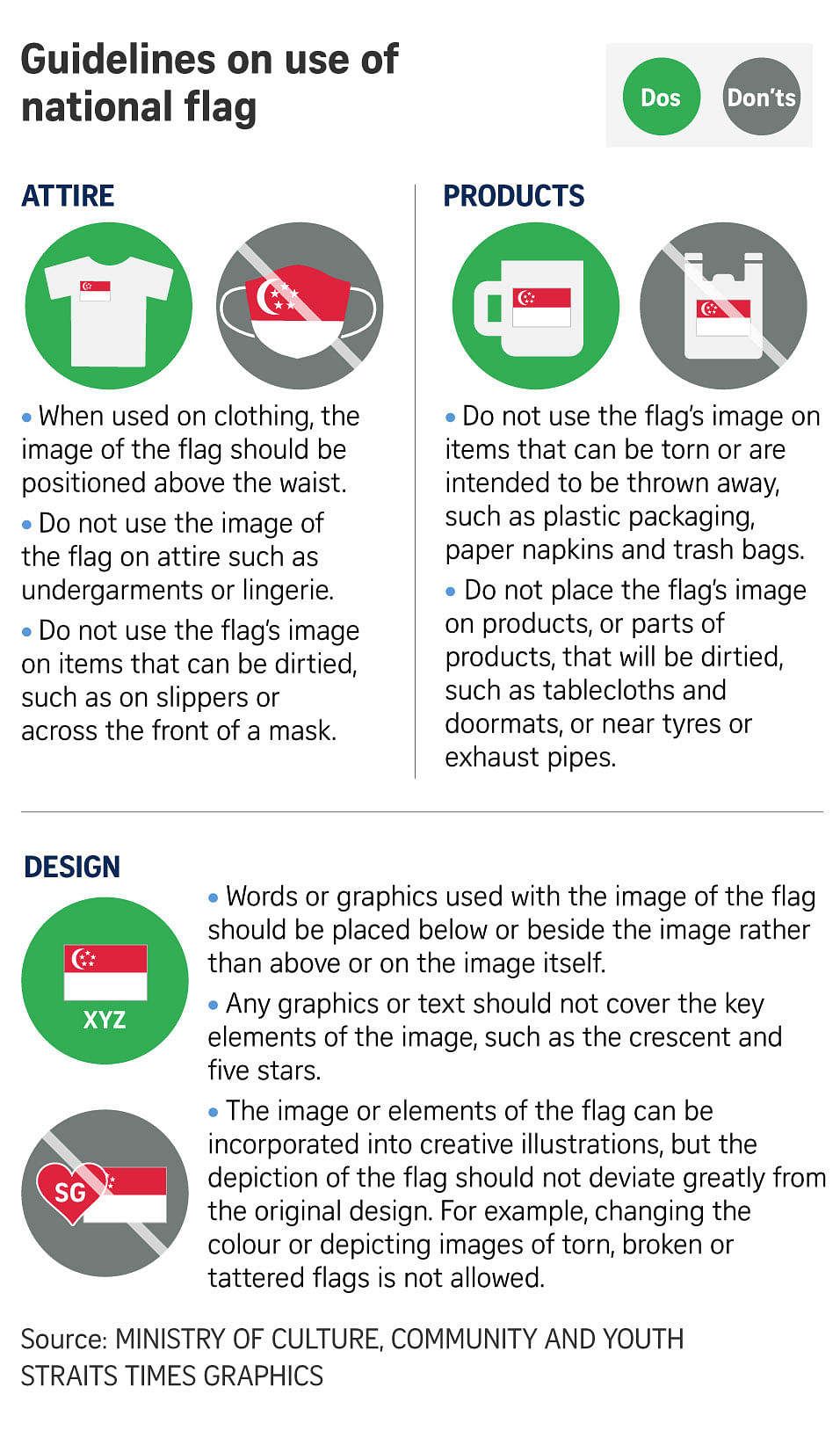SINGAPORE - When the National Symbols Act and its regulations take effect on Tuesday, rules governing the use of the national flag will be eased, and stronger safeguards will be in place to protect against the misuse of national symbols, the Ministry of Culture, Community and Youth (MCCY) said on Monday.
To encourage the use of the flag to showcase national pride, Singaporeans and businesses will not need to seek approval from the Minister for Culture, Community and Youth in two instances, as long as the flag or its image is used respectfully:
- Using the national flag or its image for commercial or decorative use during the National Day period from July 1 to Sept 30;
- Applying the national flag or its image on attire for non-commercial purposes all year round.
In another key change, the Minister for Culture, Community and Youth may also allow the national flag to be displayed outside the National Day period, without a flagpole and illumination at night, for a gazetted time.
For example, in the event of a national celebration of a sporting achievement, the minister can declare a period for the display of the flag at homes, without amending the legislation.
In its statement released on Monday, MCCY said: “This change is in response to calls from Singaporeans to fly the national flag from their homes on occasions of national significance beyond National Day, as an expression of national pride and solidarity.”
Besides rules on how the national flag is used, the Act provides a framework to promote appropriate use of other national and presidential symbols, while allowing for more leeway for Singaporeans to use some of these symbols to express national pride and solidarity.
Besides the national flag, the other national symbols are the National Anthem, the national pledge, the state crest, the lion head symbol, the national flower and the public seal.
The presidential crest, presidential standard and presidential seal have also been formally recognised as presidential symbols under the new Act, which was passed by Parliament in September 2022.
The new Act will replace the Singapore Arms and Flag and National Anthem Act and Rules.
These legislative changes were informed by a series of public engagements that sought public views on the governance and use of the national symbols.
The Act also has stronger safeguards in place now, through updated regulations, to protect against the misuse of national and presidential symbols, given that there are now more modern uses for them.
As digital copies of national symbols can be made, the new regulations cover how these versions – and other types or reproductions – can and should be used respectfully.
For example, the production and display of flags with a modified or distorted design of the national flag are prohibited, while distortion or modification of the design of the state crest and presidential crest will not be allowed.
As for the National Anthem, those who want to use the song for commercial purposes will need permission from the Minister for Culture, Community and Youth.
Regulations on how the anthem can be used have also been updated to include all types of productions of musical records, including digitally created covers. Also, anyone making a musical record that includes the National Anthem should not rearrange the song such that it contravenes the regulations.
The national pledge must always be recited in full, in any of Singapore’s four official languages. It cannot be used for commercial purposes, unless authorised by the Minister for Culture, Community and Youth.
The ministry said it will first take an advisory approach if an individual or business is found to have breached the regulations.
However, the next step would be to enforce a stop order mechanism to those who have used the national flag, National Anthem or national pledge disrespectfully.

MCCY said: “This mechanism will provide clarity on what is disrespectful use and will give users a chance to correct their actions before further action is taken. Individuals served with the stop order may appeal to the minister.”
Failure to comply with a stop order will constitute an offence, added the ministry. However, there are some instances, such as the burning or desecration of the flag, which warrant immediate action.
The Act has a maximum penalty of $30,000 and a six-month imprisonment term for offences that violate the regulations.
The new maximum penalty is similar to existing penalties for defacing a national monument under the Preservation of Monuments Act 2009.
MCCY said it will continue to explore the suggestions and feedback gathered during the multiple public engagements, including providing clear guidance on appropriate use and accessible feedback channels.
“While the legislative review has concluded, the work to promote public education on respectful usage of the symbols through our regulatory and promotional programmes will remain important going forward,” added the ministry.

